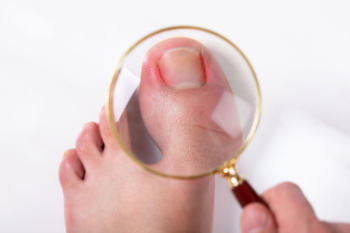
An ingrown toenail occurs when the edge of the toenail grows into the surrounding skin causing pain, redness, and swelling. This condition typically affects the big toe, although it can occur on any toe. Ingrown toenails are often caused by improper nail trimming, where nails are cut too short or rounded at the corners. Wearing tight-fitting shoes that apply pressure on the toes can also contribute to the problem. In some cases, trauma or injury to the toenail can lead to an ingrown toenail. The nails can become infected when left untreated, leading to increased pain, pus, and inflammation. Infection occurs when bacteria enter the broken skin surrounding the nail, causing the area to become swollen and tender. If you have an ingrown toenail, it is suggested that you consult a podiatrist who can offer effective treatment options that may keep it from getting infected.
Ingrown toenails may initially present themselves as a minor discomfort, but they may progress into an infection in the skin without proper treatment. For more information about ingrown toenails, contact Daniel Bell, DPM of Florida. Our doctor can provide the care you need to keep you pain-free and on your feet.
Ingrown Toenails
Ingrown toenails are caused when the corner or side of a toenail grows into the soft flesh surrounding it. They often result in redness, swelling, pain, and in some cases, infection. This condition typically affects the big toe and may recur if it is not treated properly.
Causes
- Improper toenail trimming
- Genetics
- Improper shoe fitting
- Injury from pedicures or nail picking
- Abnormal gait
- Poor hygiene
You are more likely to develop an ingrown toenail if you are obese, have diabetes, arthritis, or have any fungal infection in your nails. Additionally, people who have foot or toe deformities are at a higher risk of developing an ingrown toenail.
Symptoms
Some symptoms of ingrown toenails are redness, swelling, and pain. In rare cases, there may be a yellowish drainage coming from the nail.
Treatment
Ignoring an ingrown toenail can have serious complications. Infections of the nail border can progress to a deeper soft-tissue infection, which can then turn into a bone infection. You should always speak with your podiatrist if you suspect you have an ingrown toenail, especially if you have diabetes or poor circulation.
If you have any questions, please feel free to contact our office located in Pembroke Pines and Plantation, FL . We offer the newest diagnostic and treatment technologies for all your foot care needs.
